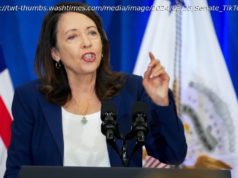The government shutdown has now entered historic territory, and the Trump Administration is moving closer to a “national emergency” or other extra-legal means
As the government shutdown heads into record-breaking territory, surpassing the three-week long shutdown of December 1995 to January 1996 of the Clinton/Gingrich Era assuming, as seems likely, it lasts through the end of today, the White House seems to be inching closer to making an end run around Congress and the Constitution and declaring a “national emergency” to get his wall built or otherwise finding a way to divert funds allocated by Congress for other purposes, including disaster relief, to pay for construction of the wall
McALLEN, Tex. — President Trump traveled to the border on Thursday to warn of crime and chaos on the frontier, as White House officials considered diverting emergency aid from storm- and fire-ravaged Puerto Rico, Florida, Texas and California to build a border barrier, perhaps under an emergency declaration.
In a sign of growing unease about the partial government shutdown, some Senate Republicans came off the sidelines to hash out a deal that would reopen the government as Congress worked toward a broader agreement tying wall funds to protection for some undocumented immigrants and other migrants.
But before those negotiations could gain momentum, they collapsed. Vice President Mike Pence and other members of Mr. Trump’s team let it be known privately that the president would not back such a deal.
“It kind of fell apart,” said Senator Lindsey Graham, Republican of South Carolina, who was among those Republicans seeking a deal.
But Mr. Trump’s advisers, including his son-in-law and senior adviser, Jared Kushner, have urged him to try to find other approaches than declaring a national emergency. Mr. Kushner’s role was first reported by The Wall Street Journal.
The advisers have warned him of a range of possible negative outcomes, particularly the risk of losing in court, people familiar with the discussions said.
Aides have suggested that Mr. Trump would be giving a dysfunctional Congress a pass from fulfilling its duties if he makes an aggressive move. And some of his more conservative advisers have suggested a national emergency declaration is a form of government overreach that is antithetical to conservative principles.
As the shutdown neared Day 21 — the second longest in history — Mr. Trump used a visit to a border facility in McAllen, Tex., to blame the protracted shutdown on Democrats, charging that their opposition to a wall was responsible for brutal crime and violence.
“You’ll have crime in Iowa, you’ll have crime in New Hampshire, you’ll have crime in New York” without a wall, he warned.
“We could stop that cold,” he added.
Mr. Trump also repeated his demand for the money from Congress while saying that Mexico would somehow provide funds indirectly for the wall, a contradiction of what he said in December when he wrote in a Twitter post, “I often stated, ‘One way or the other, Mexico is going to pay for the Wall.’ ”
“I didn’t say they’re going to write me a check for $10 billion or $20 billion,” Mr. Trump said on Thursday. “If Congress approves this trade bill, they’ll pay for the wall many times over. When I say Mexico’s going to pay for the wall, that’s what I mean.”
It was among the bewildering statements that underscored his often contradictory attempts to force Democrats to capitulate. Mr. Trump renewed his threat to declare a national emergency and build his wall without congressional approval.
“We can declare a national emergency,” Mr. Trump said. “We shouldn’t have to.”
(…)
The implosion of the congressional deal left lawmakers bracing for Mr. Trump to declare a national emergency. Senior Democrats were exploring both legislative and legal options to challenge the move.
The president is allowed to divert unspent money from projects under a national emergency. But a senior administration official who spoke on the condition of anonymity to describe confidential discussions, questioned the legality of using Army Corps funding, saying it would be subject to restrictions under the Stafford Act, which governs disaster relief. The official said the process was as much a political exercise intended to threaten projects Democrats valued as a pragmatic one.
“That would be a travesty,” Representative Peter A. DeFazio, Democrat of Oregon and the chairman of the House Transportation and Infrastructure Committee, said in an interview.
“It’s all speculative at this point,” he said, alluding wryly to Mr. Trump’s penchant for abrupt announcements at all hours of the day and night.
Home
United States
USA — mix As Shutdown Continues, Trump Inches Closer To Declaring 'National Emergency'






